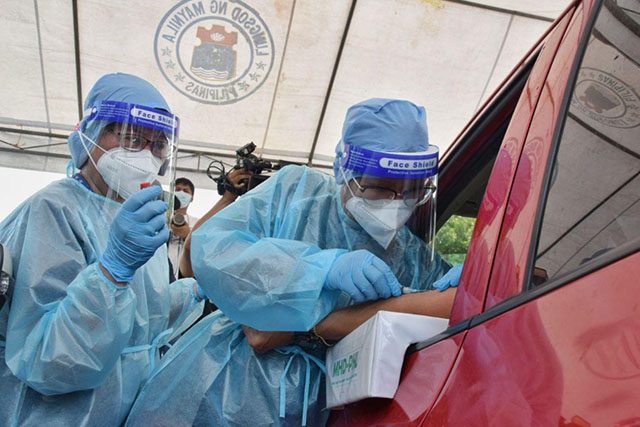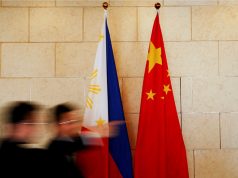
Mass testing is now available to Filipinos in the city of Manila through the efforts of the local government unit.
Manila residents and non-residents can avail of free COVID-19 tests in the nation capital’s first COVID-19 drive thru testing facility located in front of the Andres Bonifacio Monument in Ermita.
Manila Mayor Isko Moreno launched this initiative on Wednesday.
Reports said that it is open on weekdays from 8 a.m. to 5 p.m.
Filipinos who want to get tested only need to show a government-issued identification card once they drive by the area and have their blood samples taken.
The results will be available within 24 hours either through text or e-mail.
Moreno said that a swab test will follow for people who have tested positive in the blood sample test.
The city on Thursday reported that 24 people have tested positive for COVID-19. Most of the people who availed of the free detection cited that they took it for their “peace of mind.” Others underwent the test for work and travel purposes.
The current testing capacity of the center is at 11,000 but Moreno said that the city will attempt to purchase more testing machines “to embrace as many (Filipinos) as possible and give them peace of mind.”
LOOK: Manila City Mayor Francisco "Isko Moreno" Domagoso leads the launching of the city's drive thru COVID19 testing…
Posted by Manila Public Information Office on Wednesday, July 15, 2020
Another COVID-19 drive-thru is eyed in Quirino Grandstand, where Moreno said that they will put up lanes for every vehicle type such as four-wheeled ones, tricycles and pedicabs and bicycles and motors.
The city previously purchased serology testing machines from American healthcare firm Abbott, which mentioned that it has an “accuracy rate of 99.6-percent specificity and 100-percent sensitivity.”
Means to slow down an outbreak
Meanwhile, Moreno’s initiatives were welcomed by some Filipinos who have been clamoring for a mass testing initiative to thoroughly detect and isolate those who are infected with the highly-transmissible virus.
“Not really a fan of Isko Moreno but his efforts of conducting mass testing within Manila is really commendable. Sana all mass testing,” a Twitter user commented.
“Kelan kaya marerealize ng national government natin ‘to?” another online user said.
“See? That’s why we demand a Nationwide Free Mass Testing!!! Everyone here is thinking about their health, minding the risk of getting infected,” a Filipino likewise said.
Associate professor Karen Grepin, who teaches at the University of Hong Kong‘s school of public health, similarly lauded the mayor’s initiative and said that “it is also the right thing to do” from a “public goods perspective.”
She retweeted a news report that quoted Moreno who said that the surge of people in the first testing site shows they are willing to be tested for COVID-19 if it is free.
“Totoo pala na ang tao, gusto niyang magpatest but the problem is wala siyang access. Second problem is economic, walang pera eh, hindi kumita eh. Oh ngayon nagkaroon ng libre, dumagsa,” he said in a briefing.
The public has long clamored for the national government to conduct mass testing initiatives to properly isolate those who are infected with the virus, especially since there are asymptomatic individuals or those who are infected but do not show symptoms.
Scientists Unite Against COVID-19, an alliance of Filipino scientists, organizations and concerned individuals, said that mass testing involves the following:
- All suspected cases
- All close contacts of confirmed or probable cases
- Regular testing of all frontline health care workers
- Surveillance for high-risk communities or vulnerable populations
The World Health Organization said that the best way to slow the advance of the virus is to conduct massive testing initiatives in order to isolate those who are infected and prevent further transmission.
“You can’t fight a virus if you don’t know where it is. Find, isolate, test and treat every case to break the chains of transmission. Every case we find and treat limits the expansion of the disease,” WHO director-general Dr. Tedros Adhanom Ghebreyesus said in a press conference before.
Anthony Costello, a professor of global health and sustainable development at the University College London, notes that testing is done to track down cases, identify their household cluster, trace people they’ve had contact with and then isolate them through quarantine.
“Testing is the basis of public health detective work to shut down an epidemic,” he wrote in The Guardian last March.









